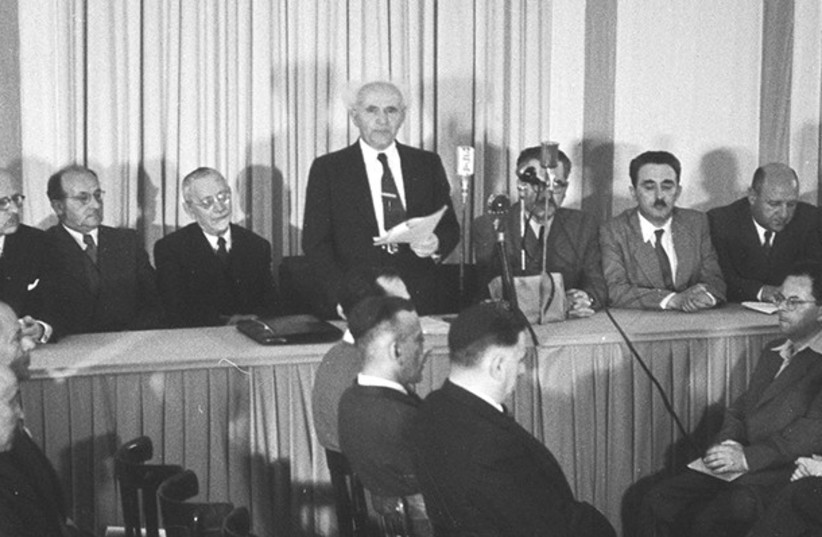Born in a firestorm, it died on ice.
The constitutional revolution that befell us a year ago Thursday – when Justice Minister Yariv Levin unveiled its 11-clause blueprint – was buried Monday, when the High Court annulled the lone clause Levin managed to make law.
The deceased plan had four aims: to limit the court’s power to annul legislation; to change the judges’ selection process, so the coalition’s politicians would control it; to cancel the court’s power to challenge executive decisions as unreasonable; and to disempower every ministry’s legal adviser, by making their recommendations non-binding.
When decomposed, some of this political molecule’s judicial atoms deserved consideration. However, in their combination, they were designed not to improve the judiciary but to subdue it. Had it been up to Levin, the judiciary would by now have lost the ability to check the government’s actions and to balance the legislature’s bills.
Fortunately, it wasn’t up to Levin, and in the end the only clause he managed to legislate was the one that canceled the court’s power to undo executive decisions. Now that sliver of reform has also vanished, as the court annulled it, thus ending the misadventure to which Yariv Levin dragged us all.
However, Levin’s defeat runs deeper than that because the court’s main point wasn’t that annulment, but the principle statement, endorsed by 12 justices, that they have no reason to treat a Basic Law differently than a regular law.
The reason is simple. For a law to be constitutional, it’s not enough that 61 lawmakers label it as such. Constitutions must reflect the broad consensus and foster it. That is why they are passed by special majorities, in many cases also requiring referendums with special majorities.

This reform was this vision’s inversion: It ignored the consensus, divided the people, and let the majority erase the minority. The constitutional principle was lost on Levin, whose aim was not to empower the people, as constitutions are designed to do, but to disempower the courts.
That’s what happened judicially. However, this saga had other layers, and they are even more important because they should guide a beleaguered Israel’s journey to its post-war tasks.
THE WAR on the judiciary deployed three divisions: the royalists, the separatists, and the zealots.
The royalists were Likudniks like Levin who wanted to shield Benjamin Netanyahu from his judges’ scrutiny and effectively place him above the law. The separatists are ultra-Orthodox politicians who want a court that will violate the principle of equality before the law and let their boys evade the draft. And the zealots want a court that will ignore Arabs’ property rights.
All three motivations are abominable to begin with; but if that didn’t matter to the plot’s mastermind, he still might have measured his opposition’s size and power before provoking its wrath.
Instead, Levin thought that with 64 fingers in the Knesset, he could do whatever the hell he pleased, only to see Middle Israel shake the country to its core and force Netanyahu to put the plan in the freezer, where it has now died.
The constitutional talks instigated by President Isaac Herzog in response to the mayhem were what should have happened in the first place. The problem with that venue was that it could deliver none of the horse theft that motivated Levin in the first place.
Realizing his revolution had been derailed, a frustrated Levin tabled that lone clause, even when he could see through the windows multitudes rallying in the streets, led by much of the industrial, economic, academic, cultural, and defense-establishment elites. One could not escape the suspicion that national consensus was for Levin, and his associates, of no value; a nuisance at best, anathema at worst.
And then war erupted, serving improbable proof of the existence, breadth, and value of Israel’s national consensus.
AS THIS column argued since the morning after Yitzhak Rabin’s assassination, Israeli society shares a broad consensus. Part of it is a resolve to defend Israel from its enemies, and the willingness to die for this cause.
A generation has elapsed since then, and the current fighting proves that what was true then remains true today. Last year’s accusations that the judiciary’s defenders are anti-patriots proved libelous. Like their parents in 1967 and their grandparents in 1948, Israelis from all backgrounds and persuasions are fighting this war shoulder to shoulder.
Not only does the Israeli consensus exist, but it is the reason we won the wars of the past and will win the current war as well.
This means that the reform’s architects should at least have appreciated the utility of the consensus, if not its value. Nothing big can be done in Israel without a broad consensus. That’s how our big wars were won, that’s how peace was struck with Egypt, and that’s how the greatest reform ever seen here – the 1985 economic stabilization plan – was passed.
Conversely, all Israeli attempts to do big things without building a consensus – most tragically the invasion of Lebanon in 1982 and the Oslo Accords in 1993 – failed.
Never mind what this dictum means for the past – that constitutional reform should have happened, but the hard way, through adversaries’ joint search for, and enshrinement of, the values they share. What matters right now is its meaning for the future.
When this war ends, Israel will face enormous reconstruction tasks: physically, socially, and psychologically.
The choice will be ours: If we face them in Yariv Levin’s way, as a federation of antagonistic tribes and sects, we will end up in the same dustbin where his revolution just arrived. Conversely, if we rebuild while inspired by fraternity, the way our troops are fighting in Gaza, the sky will be the limit.
www.MiddleIsrael.net
The writer, a Hartman Institute fellow, is the author of the bestselling Mitzad Ha’ivelet Ha’yehudi (The Jewish March of Folly, Yediot Sefarim, 2019), a revisionist history of the Jewish people’s political leadership.
